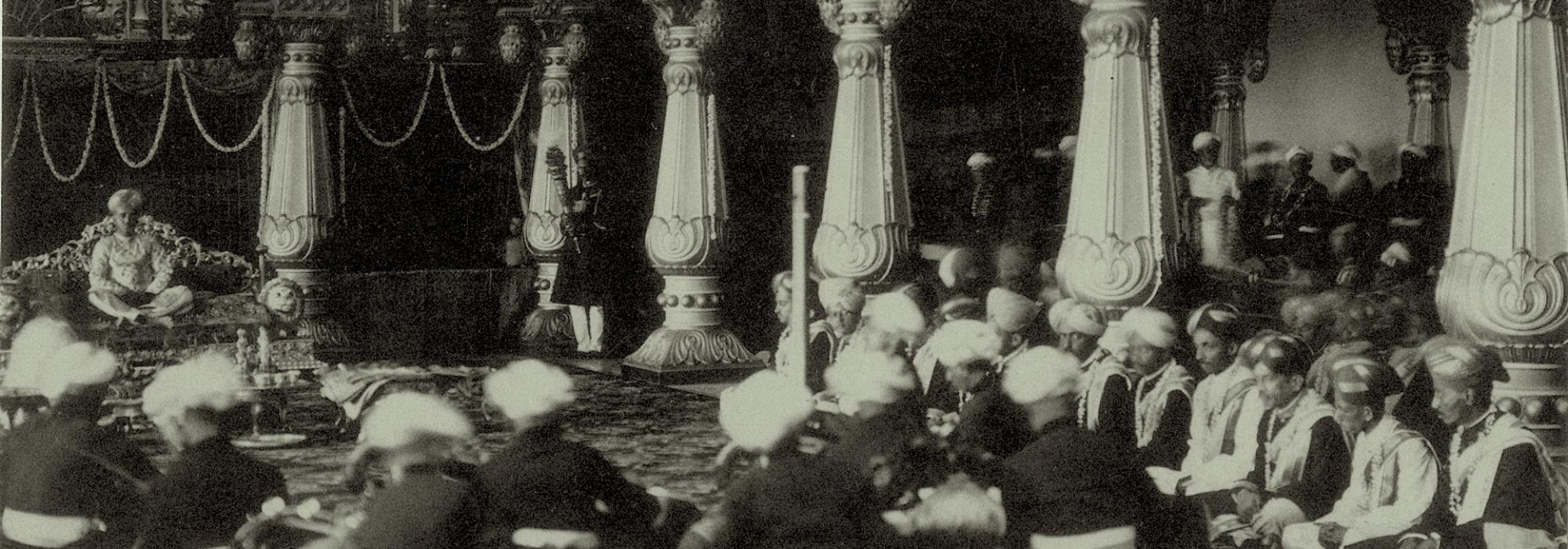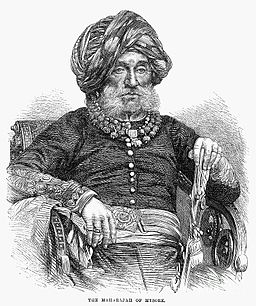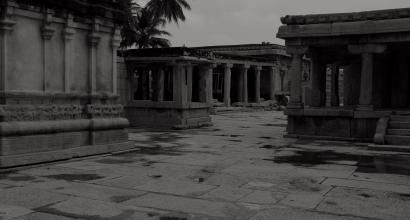Vina Sambayya was not only an accomplished player of the Vina, but was austere and orthodox in his conduct. He also knew astrology and Ayurveda. The Mysore Maharaja Krishnaraja Wodeyar III reposed great trust and respect in him. He often consulted him on intimate matters and sought his advice. Given this, isn’t it natural that at least a few music-Vidwans in Krishnaraja Wodeyar’s court felt jealous of him?
Sambayya would perform a Vina concert every Friday in the large hall in the Amba Vilas palace[i]. On a certain Friday, Sambayya’s fingers worked magic on the instrument. Elated, the Maharaja gifted him with a grand shawl and an expensive bracelet with his own hands. After the concert ended and the assembly had dispersed, the Maharaja turned to three or four of his courtiers and said, “Sambayya was indeed possessed today! He played marvellously! It’s been years since I’ve heard this sort of music!”
One of the courtiers said, “True, Sambayya is indeed amazing, except he needs to quit a habit.”
“What’s that?”
“He doesn’t know the etiquette of assembly! He twirls his moustache in the presence of His Exalted Highness.”
When Sambayya would strum the strings of the Vina, his hand would remain free but for that interval of the Vareku, or the reverberation that emitted forth after it was strung. In that interval of freedom, his hand would automatically reach for his moustache. The moustache was lush and imposing. Touching it constantly was the consequence of an age-old habit. It had no meaning whatsoever. Other Vidwans interpreted it to mean arrogance.
The Maharaja beamed a negligent smile and said, “It’s some habit. One shouldn’t notice it.” The efforts of these petty-minded Vidwans went in vain thus.
About a month or two later, in yet another Friday concert, Sambayya’s accomplishment touched another peak. As usual, the jubilant Maharaja showered profuse praise on him. Now, another Vidwan found a different trick. He said:
“The devotion and piety of Sambayya is renowned. His mind is filled with a desire for a very long time.”
The Maharaja said: “What is it?”
“From a very long time, he’s been wanting to perform a Yaga in the honour of the Devi. He is a steadfast devotee of Devi Chamundeshwari.”
“Why not? That’s not difficult. We shall provide all the necessary material and other conveniences. We shall inform the Motikhana, the treasury. You consult the astrologer, fix an auspicious Lagna[ii] and tell Sambayya to get ready.”
From then on, things proceeded according to the Maharaja’s words. The Lagna was fixed. A decorated canopy and a Mantapa was erected in front of Sambayya’s house. As part of the programme, the evening before the actual Yaga, a procession made its way to Sambayya’s house. Vedic priests performed the initatory rites. The Ritwiks chanted the requisite Vedic hymns. Sambayya and his wife were immersed in joy.
On the morning of the actual Yaga, both Sambayya and his wife partook in the sacred ritual of oil-anointment. Married Brahmin women had arrived in significant numbers. After he had finished his auspicious bath, he underwent the shaving procedure, which was an organ of the Deeksha process, which in turn qualified him to perform the Yaga. After shaving, he went to the bathroom to have bath. None of the servants who were present earlier in the morning were there. He called out. No response. He came out to the hall and saw no one there. The heaps of rice and grains lay just there as is. Half-chopped vegetables lay there orphaned with none to chop them. There was nobody in the kitchen. The orchestra that had been outside was now missing. Apart from Sambayya’s family, there was no sign of anyone. The canopy and the Mantap were empty. Sambayya was astonished. He could fathom nothing. Plus, there was no one he knew that he could ask what had happened. Presently, he spotted someone he knew walking on the street. He called out to him, explained the situation and asked him the secret behind it.
He: “Whatever work had to be done has been done, Swami. That’s why everybody has gone.”
Sambayya: “What’s that work?”
He: “The work of getting your moustache shaved off.”
Sambayya raged with fury. He was short-tempered by nature. And now this sort of thing had happened. He hoisted his Vina on his shoulders; a copper pot in his hand; he told his wife to get him some clothes for temporary use; he walked all the way to Srirangapattana. He’d have his bath and lunch there.
By then news of this incident had reached the Maharaja’s ears. He was struck with great remorse at this roguery accomplished by small-minded Vidwans. He wanted to bring Sambayya back at any cost and dispatched a few of his intimate courtiers to Srirangapattana. Sambayya told this to the royal messengers:
“From now on, this Samba will play the Vina only for that Samba (Lord Shiva). This Samba won’t bow down before any human. I have great regard for the Maharaja. But his court isn’t like him. I’m leaving for Tirupati. I’ll stay for three months in the court of the Lord there and offer him the seva[iii] of my music everyday. After that, I’ll go to Sri Kalahasti. Let those wishing to listen to this Vina come to the sanctum of the Lord.”
This is typically the fate of a majority of people who embark on public service in our country. If someone says that he or she wants to build a temple, everybody responds with, “wow! Wonderful!” To those who say that they want to build a school, the public response is, “Yes, yes, this is a great necessity.” They pat the back and offer words of encouragement. When the fool who is thus encouraged believes all this and takes initiative, they push him forward while they themselves remain safely behind and remark, “didn’t we tell you earlier that this is a crazy attempt?” They laugh among themselves at this fool, proudly basking in their own brilliance.
This is an English translation of a portion of the ninth chapter 'Mysorina Moovaru Vainikaru' of D. V. Gundappa’s Jnapakachitrashale (Volume 2) - Kalopasakaru.
Foototes
[i] Amba Vilas Palace is today’s Mysore Palace.
[ii] Lagna also means Muhurtam or a specific time on a specific date typically fixed for auspicious occasions like marriage or festivals or pujas.
[iii] Seva variously means “service,” “worship,” and “offering.”













































Comments